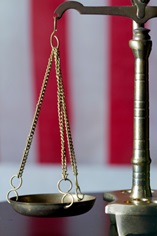Miscellaneous

Studying how and in which contexts procedural fairness principles can be applied involves many different disciplines. Below are publicly-available articles which discuss procedural justice in a variety of psychological and sociological contexts.
Minding the Court: Enhancing the Decision Making Process
Pamela Casey, Kevin Burke, and Steve Leben, International Journal for Court Administration (2013)
This article addresses recent advances in decision-making research and how it can be used by judges and courts that are interested in implementing procedural fairness principles.
The Psychology of Procedural Justice in the Federal Courts
Rebecca Hollander-Blumoff, 63 Hasting Law Journal 127 (2011)
This article examines the federal court system from the perspective of the psychology of procedural justice to determine which features of civil litigation are likely to contribute to and detract from litigants' perceptions of procedural justice.
Mechanisms of Legal Effect: Theories of Procedural Justice
Tom Tyler, Robert Wood Johnson Foundation (2011)
Tom Tyler discusses the impact that procedural fairness can have on the physical and psychological health of employees in large organizations. Tyler offers an overview of the research showing, for example, that procedural fairness can lower stress and psychosomatic problems, and reduce occupational strain. Additionally, low levels of procedural fairness have been linked with self-reported health problems and higher levels of psychiatric disorders among employees.
Application of Prcoedural Justice Research to Judicial Actions and Techniques in Settlement Sessions (abstract only)
Nancy Welsh, Donna Stienstra, and Barbara McAdoo, Penn State Law Research Paper 18-2013
This paper presents a questionnaire in which perceptions of procedural justice are assessed in settlement sessions of civil, non-family law cases. The questionnaire specifically focuses on lawyer's perceptions of judicial behavior and can be used in a variety of ways, including a method of garnering feedback and as a basis for empirical legal research.
Modeling the Message: Communicating Compliance Through Organizational Values and Culture (abstract only)
Scott Killingsworth, 25 Georgetown Journal of Legal Ethics (2012)
This article examines how principles of procedural justice can be applied in the managerial context, specifically how cultural attributes and managerial communications can either enhance or undermine voluntary adherence to organizational rules and legal requirements. Specific markers are identified to assist in developing increased compliance within the organization.
Decision Makers and Decision Recipients: Understanding Disparities in the Meaning of Fairness
Diane Sivasubramaniam and Larry Heuer, Court Review 44 (2007)
This article reviews the results of several quantitative studies that look at whether decision makers such as judges are impacted by procedural fairness in the same way that decision recipients are. The data suggests that decision makers are more concerned with efficiency and decision outcomes, and are less-impacted by procedural fairness than are decision recipients.
Restorative Justice and Procedural Justice: Dealing with Rule Breaking
Tom Tyler, 62 Journal of Social Issues 307 (2006)
Currently, the dominant model of rule breaking is sanction-based. This article looks at three alternative approaches to dealing with rule breaking (the procedural justice model, the restorative justice model, and the study of moral development) and examines how these models might encourage rule following.
